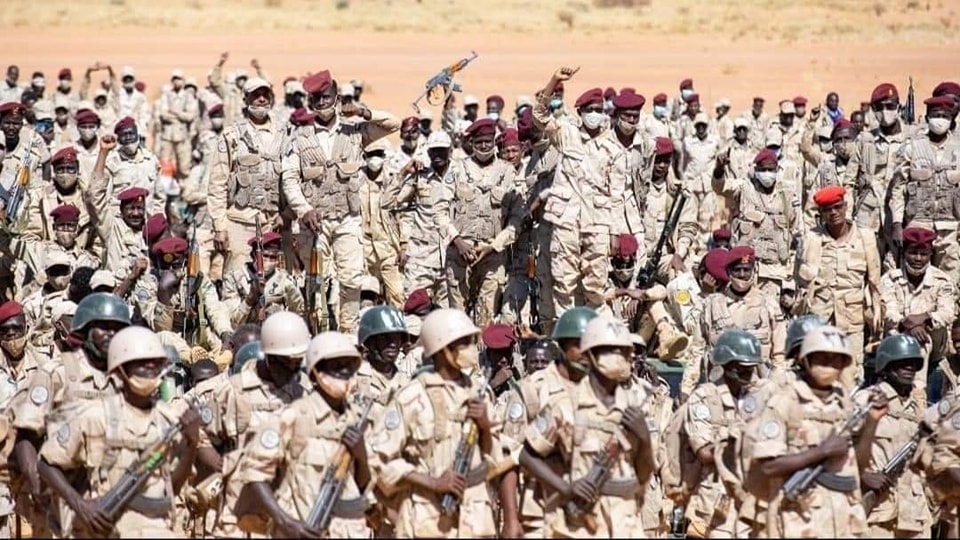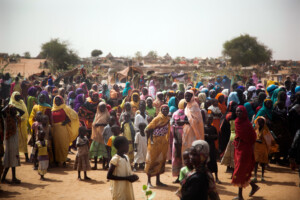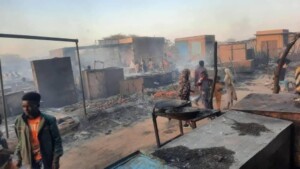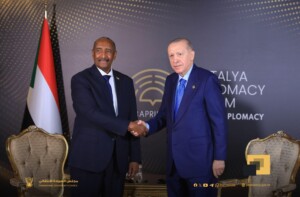Sudan: concerns over possible SAF-RSF escalation, allegedly fuelled by Al Bashir regime supporters

Rapid Support Forces in Merowe, Northern State (File photo: RSF social media)
KHARTOUM – April 14, 2023
Both Sudanese and international communities call for de-escalation as concerns over a possible escalation of tensions between the Sudan Armed Forces (SAF) and Sudan’s largest paramilitary, the Rapid Support Forces (RSF), have grown after the RSF deployed its forces in Khartoum and other central parts of the country. Several Sudanese parties point fingers at the now-dissolved National Congress Party of ousted dictator Omar Al Bashir.
The more than 40 civilian parties and groups that signed the Framework Agreement on December 5 called on the Sudanese people “to confront the plans of the defunct regime and any calls for war and military escalation” in a statement this morning.
“We decided to meet urgently with the leadership of the Sudan Armed Forces and the Rapid Support Forces and put forward practical ideas to overcome the current tension and restore the political track.”
They also stated that “elements of the National Congress Party seek to stir up discord by driving a wedge between the armed forces”.
‘Elements of the National Congress Party seek to stir up discord by driving a wedge between the armed forces’ – the civilian Framework Agreement signatories
The mainstream Forces for Freedom and Change-Central Council (FFC-CC), who were a driving force behind the Framework Agreement, also published a press release today after an emergency meeting held by the Executive Office of the FFC-CC yesterday evening.
After “extensive discussion”, they came to the conclusion that “the current scheme is a scheme for the remnants of the former regime aimed at destroying the political process”.
“We call on our people and the forces of the living revolution to expose the dissolved National Congress Party and confront its plans.”
The statement also said that the FFC-CC welcomes the initiatives of the resistance committees and civil society. “We declare our readiness for joint action to confront the conspiracies of the dissolved National Congress Party, and we see that the basis of the crisis is not between the army and the RSF but rather lies in the attempts of the remnants of the former regime to return to power. They are ready to drag the country into civil war.”
‘They are ready to drag the country into civil war’ – the FFC-CC
The FFC-CC held a series of meetings on the political process, including with the military, the last of which was on Saturday and was attended by the El Burhan and Hemeti.
The FFC-CC explained that the meeting had “reached results that were not implemented”. “Nevertheless, our communication continues, and we believe that the way out of the current crisis lies in completing the political process.”
A meeting also took place with the International Quartet [USA, UK, UAE, and Saudi Arabia] at the house of El Tahir Hajar on Wednesday evening to strengthen efforts, defuse the crisis, and complete the Final Agreement, “because the real solution to the crisis lies in completing the final political agreement and establishing a civil authority whose most important tasks are resolving the security and economic crisis”.
Rising tensions
The simmering tensions between Lt Gen Abdelfattah El Burhan’s army and Lt Gen Mohamed ‘Hemeti’ Dagalo’s paramilitary RSF surfaced early yesterday morning when the SAF issued a statement denouncing the increased deployment of RSF troops in Khartoum and in Merowe in northern Sudan.
“The country is going through a historical and dangerous turn, and its dangers increase with the mobilisation of the RSF and their redeployment inside the capital and some other cities,” the statement warned.
Rumours of a split between the two parties, who effectively control Sudan’s government after staging a joint coup in October 2021, have made the rounds for over two years but intensified in the past months as the parties need to negotiate on military and security reform for the upcoming Final Agreement.
On April 1, the civilian signatories of the Framework Agreement decided to postpone the signing of the Final Agreement for five days to give the junta members extra days to resolve their differences over the reforms. Yet April 6 passed without a signing ceremony.
Journalist Kholood Khair warned that the threat of escalation is part of the ‘modus operandi’ of Sudan’s putschists; they “raise the stakes by threatening war” to then “gain concessions from those pushing for change, domestic or international,” so that they can “de-escalate and keep the concessions”.
She said yesterday that there is still a chance to avoid heavy clashes but that “this will take a coordinated and *rapid* international response”.
International response
Envoys of the European Union and the Troika [France, Germany, Norway, the UK, and the USA] published a statement on the rising tensions in Sudan yesterday to express their deep concerns over the risk of escalation.
“Escalatory actions threaten to derail negotiations toward the establishment of a civilian-led transitional government. We call on Sudan’s military and civilian leaders to take active steps to reduce tensions. We urge them to hold to their commitments and engage constructively to resolve outstanding issues on security sector reform to establish a future unified, professional military accountable to a civilian government.”
“Now is the time to enter into a final political agreement that can deliver on the democratic aspirations of the people of Sudan,” the statement read.
The statement was scrutinised by African politics analyst Cameron Hudson who said that this joint statement “makes it sound like there is a properly structured, organised and transparent process for negotiating security sector reform with civilians. But there isn’t and that is contributing to both the delay in reaching a final solution and allowing all kinds of spoilers [and] outside actors to try to influence the outcome”.
He compared the current talks on Sudan’s security sector reform to the security talks around South Sudan’s independence, “which had negotiating committees, working papers, and were organized outside the country under international mediation,” whilst “this process appears ad hoc unorganised and totally subject to the whims of whatever ambassador, political leader, general, or foreign official is able to get one of the two military leaders on the phone to influence their next move”.
“It [is] a textbook example of how NOT to structure this kind of negotiation,” he wrote on Twitter.
‘It is a textbook example of how NOT to structure this kind of negotiation’ – Cameron Hudson
RSF Commander and Deputy Chairman of Sudan’s Sovereignty Council Hemeti indeed spoke on the phone today with US, UK, and Norwegian special envoys.
In the joint phone call, Hemeti reportedly stressed his commitment to the Framework Agreement and to removing the military from politics, and his efforts to bring the political transition to its conclusion.
He underlined his keenness to maintain stability and work to support the democratic transition process in the country, the Sudan News Agency (SUNA) reported today.
Militia recruitment
Both sides have been accused of recruiting new militias within Sudan. Activists in Northern Sudan recently criticised the recruitment operations carried out by the Northern Shield Forces, a militant defence group in the area consisting of elements of the defunct Omar Al Bashir regime, amidst growing concerns over the nationwide spread of the Sudan Shield Forces.
“Recruitment operations outside the official armed forces could lead to civil wars, as is happening in some countries such as Yemen and Iraq,” one warned.
‘The RSF seeks to swallow the army through continuous recruitment campaigns’ – Lt Col Arbab
Retired Sudanese Navy Lt Col Omar Arbab recently stated that “the RSF seeks to swallow the army through continuous recruitment campaigns”.
On the possibility of a collision between the army and the RSF, Lt Col Arbab told Al Taghyeer news outlet last year that “there is no doubt that the movements and expansion of the RSF have been denounced within the army” and that the “has doubled its military power and expanded in other economic and social areas, even externally, and it has become a state within a state, and this is a worrying matter”.
He also accused the Sudanese army of involvement in the formation of new militias such as the Homeland Shield Forces and the Sudan Entity Forces and warned of the dire consequences of this approach.
A recent report by journalist Um Zein Adam for the Sudanese El Demoqrati newspaper also covered the events. She wrote that, when listening to the statements of SAF Commander and de facto government leader Lt Gen Abdelfattah El Burhan, he always says that he is in support of a civilian government and the army’s exit from the political process.
“On the ground however, since the coup, tribal groups have been working to form armed forces in areas that have not witnessed any armed conflict before, in the north and centre of the country, the latest of which is the Sudan Shield Forces that announced themselves in mid-December without the authority taking any action against their formation.”
A military expert told Radio Dabanga in February that the establishment of the Sudan Shield Forces and the fact that they appear at this time in central Sudan in large numbers and have even occupied markets “indicates support by a specific party”.
He accused the defunct regime of Omar Al Bashir of standing behind the establishment of the forces and explained that the method of establishment is similar to that of the RSF, which was set up by the Al Bashir regime and is widely held responsible for many atrocities in Sudan, especially in Darfur.
In an interview with El Demoqrati newspaper, political analyst and journalist Mahdi Rebeh also stated that the Sudan Shield Forces and other militant groups are the work of the defunct regime.











 and then
and then